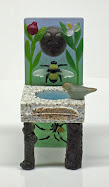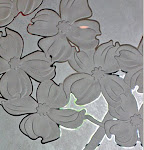I'm
still in model making phase, the sculpture part. I probably enjoy
this part the most as this is the real making of the piece. What
comes after is just transformation from one medium to another. I've
switched from feathers to another box, the heron box. This is the
last box I have planned. That doesn't necessarily mean it will be
the last box I do but it is the last one waiting in the wings. The
last four and this one, I've been playing with precast inlays as
decoration. I cast all the pieces separate and then, with a fair
amount of cold work, get the recess in the side of the box and the
cast element to fit easily and then I glue the inlay in. Of course
the separate wax pieces fit together as wax but there's a lot that
happens between wax and glass and some tweaking is always necessary.
I don't use the precast inlay as an inclusion in the wax box because
in the mold, the inlay will be vertical and once molten again, the
glass could start to flow out before the rest of the glass fills the space.
So
far I have the inlay carved and mounted on a sheet of wax in
preparation for the mold making
and the box constructed and am
carving water lines on all four sides.
The top, which I haven't started
yet, will have a feather as an ornament so in some ways, I guess I'm
still working on a feather piece. I have an actual blue heron
feather that I found years ago when the grandboy was here on one of
his weeks. We drove out to Lake Texana State Park on the Navidad
River, or what was Lake Texana State Park before the state
relinquished it, and I took the boy out in a canoe and there on the
opposite bank of this little lake was the feather. I made him get out and fetch it for me. I haven't worked out the feet to the piece yet.
I
enjoy showing my models and their progress as I work on them though I
am thinking I may stop doing that because maybe seeing the models prejudices the viewer's opinion towards a piece. My cast glass has never been
monochromatic and working in the pate de verre technique was the
first time I ever really worked with color. The other glass art that
I have done, the commissioned etched and carved glass, has all been
nothing but monochromatic. The point about showing, or not as the
case may be, my finished models is sometimes people mistake them for
the finished glass piece. Sort of the flip side to that are the ones
who suggest casting it monochromatically because they love the way
it looks in wax. I haven't so far because it requires a sea change in
my thinking about whatever particular piece is being discussed and
because the whole pate de verre technique is about color and color
placement. I don't reject the idea out of hand but I'll have to do a
piece with that in mind from the beginning.
I
have done a set of pieces, the bark squares, in black and white, or
rather 5 black and one white in the set so far, but I've put them
aside for now because I'm still not sure what I am doing with them.













Wonderful. I am so glad I stumbled upon your blog as I am slowly beginning to learn about this art medium.
ReplyDeleteOne of the things I am most gobsmacked about your work is, is that you are not just an artist but a very, very dedicated craftsperson. Your techniques must be so honed in order to create the artistic vision you have in your mind.
ReplyDeleteAbsolutely amazing, woman!
well, thanks. I'm more or less successful in achieving what I set out to do. I am a stickler for detail. Too much so as I will zero in on things no one else will ever see adding more time to an already lengthy process. I'm trying to be better about that.
DeleteLove that heron's head.
ReplyDeleteThere's a wonderfully sensual quality to your work.
ReplyDeleteThe box is coming along beautifully! The heron's head is remarkably detailed. I can understand your hesitation to provoke in viewers a reaction different from the one the finished piece will (hopefully) achieve. I guess it's like some painters not wanting people to see their works while they're still on the easel.
ReplyDeleteyeah, I wonder if some people are less excited, for lack of a better word, in the finished piece because they hold the other image in their minds.
DeleteI swoon over your work, Lady!! You are a gift on this planet. Thank you for showing the process, though your work is still a marvelous mystery! LOVE!
ReplyDeleteI had to leave for physical therapy this morning, so I came back and re-read this to better take in what you're saying. Not that I understood any of it, but to relish the words building the box. I look for our heron every time we pass the lake, but for a week he has not been there. I guess he took up closer to open water. They don't migrate.
ReplyDeleteI don't ever see blue herons here. we have the white 'cow birds' and an occasional a green night heron. the process is rather long and complicated and I try to give enough info without getting bogged down and boring. probably doesn't help that the cross section diagram isn't exactly accurate in the placement of the part labeled 'inlay inclusion'.
DeleteI understand your hesitation, but I would miss seeing the step by step. It's just so interesting! Can't wait to see this one (& the drowned feathers) completed.
ReplyDeleteI agree that having a peek at the process is special -- and much appreciated. The heron's head is gorgeous. I do see a lot of great blues, and there's just "something" about them. You seem to have captured that spirit, so I'm especially eager to see the completed work.
ReplyDeleteI had quite an experience a couple of weeks ago. I saw a juvenile blue heron for the first time in my life. It was smaller, of course, and pretty much a duplicate of the adult, except that the neck feathers were varigated (gray, white, brown, bluish) and the bill is two colors until it matures.
I love to see your progress posts, all the stages revealing the tremendous knowledge and talent you have - and it is fascinating to see how you approach creating, the times of clarity and uncertainty in working towards the finished piece
ReplyDelete